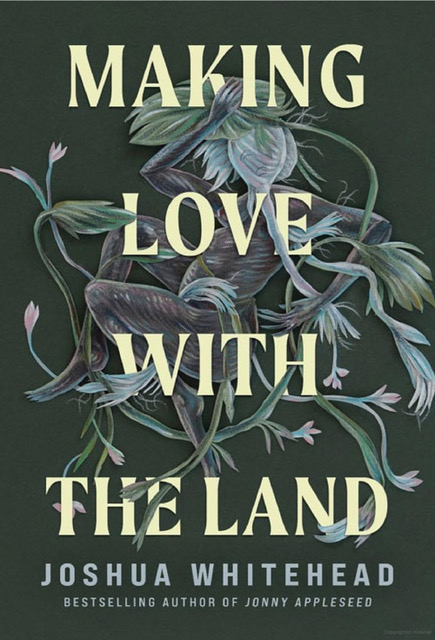In his first book of what settler publishing describes as nonfiction, Joshua Whitehead traces his experience of intergenerational trauma back to 1492, allying himself with the suffering of Indigenous peoples who’ve lived in the Americas since Europeans dropped anchor. Their lasting anguish affects him every day, whether on Treaty 1 territory in Manitoba, where he grew up in the Peguis First Nation, or on Treaty 7 territory as a University of Calgary assistant professor. The texts in Making Love with the Land illuminate steps he’s taken thus far in the journey to bodily shed colonialism. “For surely, writing… empowers, uplifts,” Whitehead affirms “in My Body is a Hinterland,” “and grants representation to those communities of which I am a part.”
The plural “communities” is crucial, for Whitehead’s sense of agency finds its most animated expression where his Indigeneity, predicament as a BIPOC person, and Two-Spiritedness intersect. In “A Geography of Queer Wounding,” he articulates more clearly than I’ve read elsewhere what Two-Spiritedness is and how those purporting to be inclusive still normalize it as conventionally queer—a trespass I approach by reconsidering how the suffixing of “2S” to LGBTQ2S encloses it as one more settler-authorized, same-sex binary. To explain the distinctions, Whitehead turns to nêhiyawêwin (Cree): “ᐊᐧᓀᔨᐦᑕᒥᓴᔭᐃᐧᐣ (waneyihtamisâyâwin), the ᓀᐦᐃᔭᐤ (nêhiyâw [or Cree]) word for queer, as in strange, but it is also defined as uncanny, unsettling; or ᐊᐧᓀᔨᐦᑕᒧᐦᐃᐁᐧᐃᐧᐣ (waneyihtamohiwewin), the act of deranging.” One of this essay’s pleasures comes from encountering the Cree syllabary and phonetic transliterations throughout, a path Whitehead blazes by providing English translations the first time each Cree expression is used.
The most searching text in this book is “Writing as a Rupture.” Having published full-metal indigiqueer (poetry) and Jonny Appleseed (his award-winning novel), Whitehead argues that the divides settlers insert between genres don’t fairly reflect his obligations as a First Nation writer. In fact, Making Love with the Land is his attempt to locate forms that are more hybrid, Indigenous, and, I hazard to say, Two-Spirit: “I have pinned myself to the concept of an otâcimow, a storyteller, something that… in nêhiyawêwin denotes… we are not only storiers but also legend-speakers.” He maintains that if settler “autobiography is an obituary, then in nêhiyawêwin it is a wildly engendered genre of returning and of revival… glimmering hope into the ‘now.’ ” In this book, Whitehead in essence declares it his lifework to filter the traumas of all Indigenous peoples through what’s made them beautiful and communities of individuals with substance all along.
John Barton is an editor and the author of 12 books of poetry.
_______________________________________


